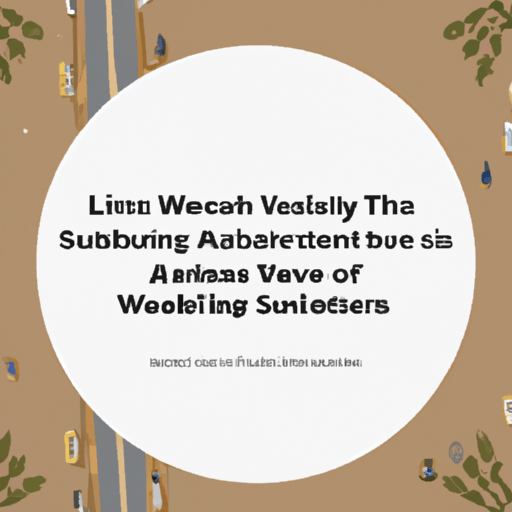Have you ever wondered what it would be like to live off the grid, away from the hustle and bustle of city life? Perhaps you’ve come across the phenomenon of van life, where people choose to live in converted vans and travel freely. But, have you ever stopped to think about how sustainable this lifestyle really is? In this article, we will explore the sustainability of van life and delve deeper into the environmental and social aspects of this growing trend.
When we think about van life, we envision the freedom of the open road, waking up to stunning views, and the thrill of exploring new places. But what about the impact on the environment? Living off grid means utilizing limited resources such as water and electricity, which often requires individuals to adopt more sustainable practices. From installing solar panels to recycling waste, van lifers are finding innovative ways to minimize their environmental impact.
Furthermore, van life goes beyond just sustainable living. It also encompasses a sense of minimalist lifestyle, encouraging individuals to consume less and live more intentionally. With limited space in vans, people are forced to downsize their possessions, reducing waste and excessive consumption. This shift towards minimalism not only benefits the environment but also promotes a more mindful existence.
In conclusion, van life can be a sustainable way of living, as it encourages individuals to be more conscious of their resource consumption and adopt minimalist practices. However, it is important to acknowledge that sustainability is a continuous journey, and there are still challenges to overcome, such as finding sustainable fuel alternatives and managing waste effectively. In the next sections, we will delve deeper into the environmental and social impact of van life, providing a comprehensive understanding of this fascinating lifestyle.

Exploring the Sustainability of Van Life
Introduction
Van life has gained popularity in recent years as more people seek adventure, flexibility, and a simpler way of life. Living in a van allows you to travel and explore at your own pace, while also providing a sense of freedom and independence. However, as with any lifestyle choice, it’s essential to consider the sustainability aspects of van life. In this article, we will explore the benefits of van life, the sustainability challenges it poses, and ways to promote a more sustainable approach to this lifestyle.
Benefits of Van Life
Freedom to travel and explore
One of the most attractive aspects of van life is the freedom it offers. With a van as your home on wheels, you can travel and explore places at your own pace, without the need for fixed accommodation. This lifestyle allows you to immerse yourself in nature, discover hidden gems, and truly experience the beauty of different landscapes.
Minimal environmental impact
Compared to traditional living arrangements, van life has the potential for a significantly lower environmental impact. By living in a van, you are likely to consume fewer resources, produce less waste, and minimize your carbon footprint. With careful planning, conscious consumption, and responsible travel practices, van life can contribute to a more sustainable future.
Lower cost of living
Van life can also offer a more affordable way of living. By eliminating rent or mortgage payments, you can save money and allocate resources to other aspects of your life, such as travel experiences or investments. Additionally, living in a smaller space encourages a minimalist lifestyle, reducing the urge to accumulate unnecessary belongings and leading to financial savings.
Sustainability Challenges of Van Life
Limited access to essential resources
One of the main challenges of van life is the limited access to essential resources, such as clean water, electricity, and waste disposal facilities. Depending on your location, finding reliable sources of potable water can be a daily challenge. Energy generation and storage can also be a concern, especially when relying on traditional fossil fuel sources. Finding proper waste disposal facilities can be difficult, leading to issues with waste management.
Managing waste and wastewater
Proper waste and wastewater management are crucial for sustainability in van life. Without access to regular sewage systems, it is essential to find alternative solutions. Installing composting toilets and greywater systems can help reduce water consumption and minimize environmental impact. It is also important to dispose of waste responsibly and recycle whenever possible.
Dependence on fossil fuels
Most vans rely on fossil fuels for transportation and energy generation. This dependence contributes to greenhouse gas emissions and air pollution. However, there are steps you can take to reduce your reliance on fossil fuels, such as utilizing renewable energy sources and adopting energy-efficient practices.
Promoting Sustainability in Van Life
Harnessing solar power for electricity
One of the most effective ways to promote sustainability in van life is by harnessing solar power for electricity generation. Installing solar panels on the roof of your van can provide you with a renewable energy source, allowing you to power your appliances, charge electronic devices, and potentially even run a small fridge or heater. By utilizing the power of the sun, you can reduce your dependence on traditional energy sources and minimize your environmental impact.
Installing composting toilets and greywater systems
To address the challenge of waste and wastewater management, installing composting toilets and greywater systems in your van can be a sustainable solution. Composting toilets help convert human waste into nutrient-rich compost, eliminating the need for regular sewage systems. Greywater systems filter and reuse wastewater from sinks and showers, reducing water consumption and preventing pollution of natural water sources.
Utilizing renewable energy sources for heating and cooking
In addition to electricity generation, sustainable van life can also involve utilizing renewable energy sources for heating and cooking. Propane is a common fuel source for cooking and heating in vans, but it is not renewable. Switching to alternatives such as wood-burning stoves or electricity-powered appliances can help reduce your reliance on fossil fuels and move toward a more sustainable lifestyle.

Practicing Responsible Travel in Van Life
Respecting local communities and ecosystems
Responsible travel is essential in van life to minimize the impact on local communities and ecosystems. Be mindful of where you park and camp, following any regulations or permits required. Respect the natural environment by leaving no trace, refraining from littering, and avoiding damage to flora and fauna.
Conserving water and minimizing waste
As water is a limited resource, it is important to conserve water in van life. Take short showers, use water-saving fixtures, and collect rainwater for non-potable purposes. Additionally, minimize waste generation by opting for reusable items, composting organic waste, and recycling whenever possible.
Leave No Trace principles
When embarking on outdoor adventures, it is crucial to follow Leave No Trace principles. This means leaving your campsite as you found it, avoiding the disturbance of wildlife, and staying on designated trails. By practicing these principles, you can preserve the beauty of natural areas and ensure their enjoyment for future generations.
Sustainable Food Choices in Van Life
Eating locally and seasonally
Sustainable food choices are important in van life to support local communities and reduce the carbon footprint associated with food transportation. Whenever possible, choose locally sourced and seasonal produce. Farmers’ markets and farm-to-table initiatives are great options for finding fresh, local ingredients on your travels.
Reducing food waste
Food waste is a significant sustainability issue, and it’s important to address it in van life. Plan your meals, purchase only what you need, and use proper storage methods to prolong the shelf life of food. Composting organic waste can also help reduce food waste and contribute to nutrient-rich soil.
Growing your own food in mobile gardens
Another way to promote sustainable food choices in van life is by growing your own food in mobile gardens. Utilize small containers or vertical gardening techniques to cultivate herbs, vegetables, or even fruits. This allows you to enjoy freshly harvested produce while reducing your reliance on store-bought items.
Eco-friendly Van Life Accessories and Implementations
Insulation and energy-efficient appliances
Proper insulation is crucial for energy efficiency and maintaining a comfortable living environment in a van. Insulating materials such as foam boards or insulating panels can help regulate temperature and reduce the need for heating or cooling. Additionally, opting for energy-efficient appliances can further minimize your energy consumption.
Rainwater harvesting systems
Collecting and utilizing rainwater can be a sustainable practice in van life. Installing a rainwater harvesting system allows you to gather rainwater and use it for various purposes, from washing dishes to watering plants. This reduces your reliance on freshwater sources and promotes water conservation.
Upcycling and repurposing materials
To reduce waste and minimize your environmental impact, consider upcycling and repurposing materials in your van conversion or customizations. Use salvaged or reclaimed materials for flooring, furniture, or storage solutions. Not only will this contribute to a more sustainable lifestyle, but it will also add unique character to your van.
Creating a Sustainable Van Life Routine
Developing eco-conscious habits
Creating a sustainable van life routine involves developing eco-conscious habits. Practice energy conservation by turning off lights when not in use and unplugging devices that are not needed. Minimize water consumption by taking shorter showers and using water-saving fixtures. Incorporate sustainable practices into your daily life to reduce your carbon footprint and promote sustainability.
Regular vehicle maintenance for fuel efficiency
Regular vehicle maintenance is essential for fuel efficiency and reducing your environmental impact. Keep your van in good working condition by ensuring proper tire inflation, regular oil changes, and scheduled maintenance checks. By optimizing your vehicle’s performance, you can increase fuel efficiency and minimize emissions.
Balancing work and leisure to minimize impact
Finding a balance between work and leisure in van life is crucial for minimizing your impact on the environment. Utilize remote work opportunities or freelance gigs that align with your sustainable lifestyle. This allows you to enjoy the freedom of van life while reducing the need for excessive travel or commuting.
Community and Support for Sustainable Van Life
Joining van life communities and sharing resources
Joining van life communities can provide valuable support and resources for sustainable living. Engage with like-minded individuals who share your commitment to sustainability. Learn from their experiences, share tips and advice, and collaborate on initiatives that promote sustainable van life.
Participating in clean-up initiatives and environmental projects
Make a positive impact on the environment by participating in clean-up initiatives and environmental projects along your van life journey. Organize or join beach clean-ups, trail restorations, or tree planting activities to give back to the places you visit. By actively contributing to environmental conservation, you can help preserve the natural beauty and biodiversity of the areas you explore.
Educating and inspiring others to adopt sustainable practices
As a member of the van life community, you have the opportunity to educate and inspire others to adopt sustainable practices. Share your experiences, tips, and knowledge with fellow van lifers and people interested in this lifestyle. Through education and inspiration, you can contribute to a larger movement towards a more sustainable future.
Overcoming the Challenges of Sustainable Van Life
Finding reliable waste disposal and recycling facilities
One of the challenges of sustainable van life is finding reliable waste disposal and recycling facilities. Research and plan ahead to identify disposal sites and recycling centers along your route. Utilize online resources, apps, or local recommendations to locate proper facilities and dispose of waste responsibly.
Adapting to changing weather conditions
Living in a van means being exposed to changing weather conditions throughout your travels. This can be a challenge for energy generation and comfort. Prepare for different climates by having adequate heating or cooling solutions, insulated windows, and suitable clothing. By adapting to changing weather conditions, you can stay comfortable while minimizing your environmental impact.
Dealing with limited storage space
Limited storage space is a common challenge in van life, especially when it comes to carrying essential items and supplies. Adopt a minimalist mindset by prioritizing your needs and focusing on multi-functional items. Optimize storage solutions through creative organization and utilizing space-saving techniques. By embracing a clutter-free lifestyle, you can make the most of your limited storage space.
Conclusion
Van life can be a sustainable lifestyle choice with careful planning and conscious actions. By adopting eco-friendly practices, minimizing environmental impact, and promoting responsible travel, individuals can enjoy the freedom of van life while contributing to a more sustainable future. Embrace the opportunities van life provides for connecting with nature, exploring new places, and living in harmony with the environment. Whether it’s harnessing solar power, practicing responsible travel, or making sustainable food choices, every action you take can make a difference in creating a more sustainable van life experience.




